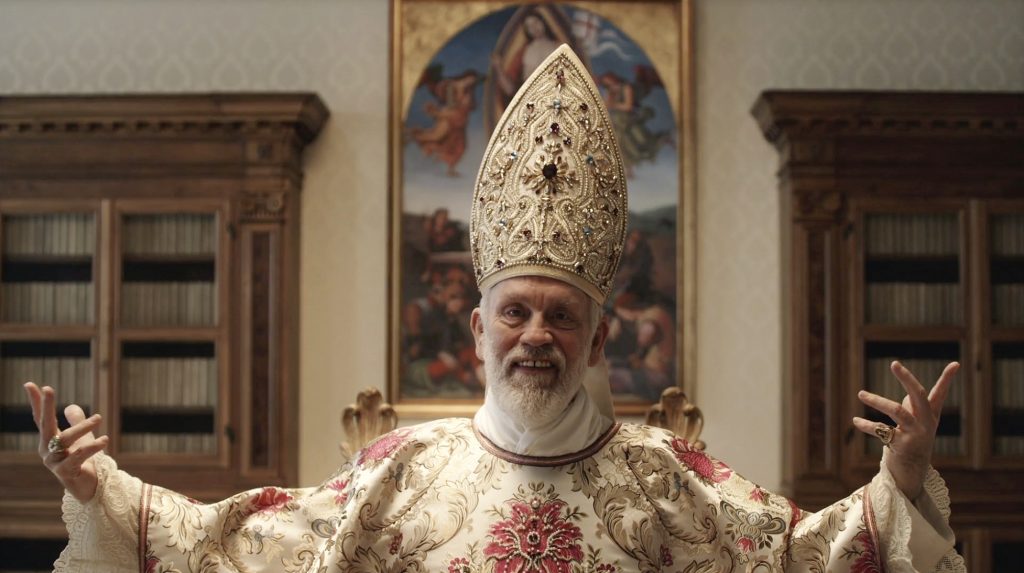“The New Pope” is a television series on HBO written and directed by the Academy Award-winning Italian auteur Paolo Sorrentino. It’s the sequel to his controversial HBO series “The Young Pope,” which came out in 2016.
In that series, Sorrentino imagined what might happen if a youthful Gen-X cardinal (played by Jude Law) ascended to the papacy. “The Young Pope” (aka Pope Pius XIII, aka “Lenny”) uses his powerful new position to avenge, among other things, his abandonment to an orphanage by hippie parents.
He is succeeded by Pope Francis II, a silly parody of Pope Francis, who has a short, controversial pontificate during which he lets immigrants bivouac in the Sistine Chapel and raises money for the poor by selling off Vatican art treasures.
After Pope Francis II “dies,” Sorrentino takes on a very different and more ambitious artistic challenge: to imagine Pope Francis II’s successor as a new pope who can speak to an abandoned generation of seekers, defend the poor, but also serve as consul to the ecclesiastical hierarchy within the Church and to the secular postmodern world at large.
It is a bold undertaking, so bold that this central theme seems almost lost on the many ex-Catholic and non-Catholic movie critics who focus their attention primarily on the show’s glitzy sex scenes, glossy pop music dance sequences, and creepy political intrigues — pretty much ignoring the seriousness of its religious ideas — ideas powerfully and poetically expressed by the charismatic new pope, John Paul III (aka John Brannox, played by John Malkovich).
In contrast to Jude Law’s angry young man pope, Malkovich plays a wealthy, weary aristocratic pontiff highly cultured in both the classical and popular sense. This new pope admires celebrities like Dennis Hopper, Marilyn Manson, and Sharon Stone because “they seem free.” And he speaks and thinks freely himself, with all the intelligence, conviction, and philosophical sophistication of his spiritual mentor, St. John Henry Newman.
Here is the new pope’s first address to his College of Cardinals:
“It frightens me to think what I am for you. For you I am the bishop of Rome. With you, I am a Christian.
“Welcome, brother cardinals. We have only one problem. I don’t know of any other. The problem is love.
“You will come to me and say, ‘Holy Father, idolatry has taken root in the form of a cult dedicated to Pius XIII. There are worrisome threats of terrorism at work within Islam, depressing business concerns weighing on the Curia, aberrations of sexual behavior, crises of work and ethics, men who murder women, women who murder children.’
“You will come to me and you will tell me all the suffering in the world, and I will say to you, ‘They are all hysterias of love.’
“The problem, brothers, is love. The question, then, is how are we to love? This is my way: with tenderness ... without passion. Passion is the eternal enemy of humility.”
He continues in this vein for several more thought-provoking minutes, and then concludes:
“Jesus explained to us what love is, but we do not have his equilibrium nor his wisdom, but we must try, my brothers, together.
“My beloved Fathers, perhaps we cannot fully express our faith, but we can express our tenderness — it is our hope and our ambition.”
Now, whatever you might think of the accuracy of this take on the current state of world Catholicism, there is no question that it is a serious and interesting attempt to address the issue.
Unfortunately, this new pope’s ideas are often crowded off the screen by the machinations of his Machiavellian Secretary of State, Cardinal Voiello and a motley crew of Vatican insiders who smoke, drink, plot, and flirt with one another. Not to mention the occasional explicit sex scenes that Sorrentino, for some reason, feels compelled to interject in his otherwise philosophically compelling thought-experiment.
And yet by mixing the sacred with the profane and the pop with the profound, Sorrentino is challenging our lazy sensibilities. And it works beautifully in the slow-motion scenes of pretty young nuns dancing to pop songs that run over the credits.
But sometimes it doesn’t work at all or goes too far, and then these juxtapositions end up just being tasteless. I am thinking of one particularly blasphemous sequence where Sorrentino interlaces two botched sexual encounters with the “Ave Maria” playing as the soundtrack.
The reason Sorrentino takes such chances lies at the heart of his film aesthetic, and in a scene set in the new pope’s palatial estate in Britain, Sorrentino, perhaps, reveals his own ends as an artist.
Asked how he converted more than 10,000 Anglicans to Catholicism (a reference to St. Newman’s own conversion to Catholicism from his Anglicanism), the new pope replies:
“By talking about other things. For years these rooms were a temple to lighthearted encounter. People expect a priest to talk about religion, but I knew revealed religion must be poetic. I’d speak to them about golf, Holderlin, Montale, the Assente football club, and the way women have of crossing their legs. Poetry. And they would discover what it means to be Catholic. It means being everything, for everything belongs to the grace of God.”
Here, in a nutshell, is Sorrentino’s own view of what a fearless new pope might, could, and should be. Perhaps, someone first has to imagine him before he can exist.
Let me close with the new pope’s views on the role of the Catholic Church in the contemporary world at large.
“The Church must not think. It needs only to protect the fragile. Our mission is to recognize, value, and protect fragility — that fragility which hides in the opaque cold of night and the crystalline cold of mid-day — wherever there is fragility there is the Church. That is who we are. We are a truth.”
“The New Pope” is rated MA for mature audiences for mild violence, nudity, and adult content.

